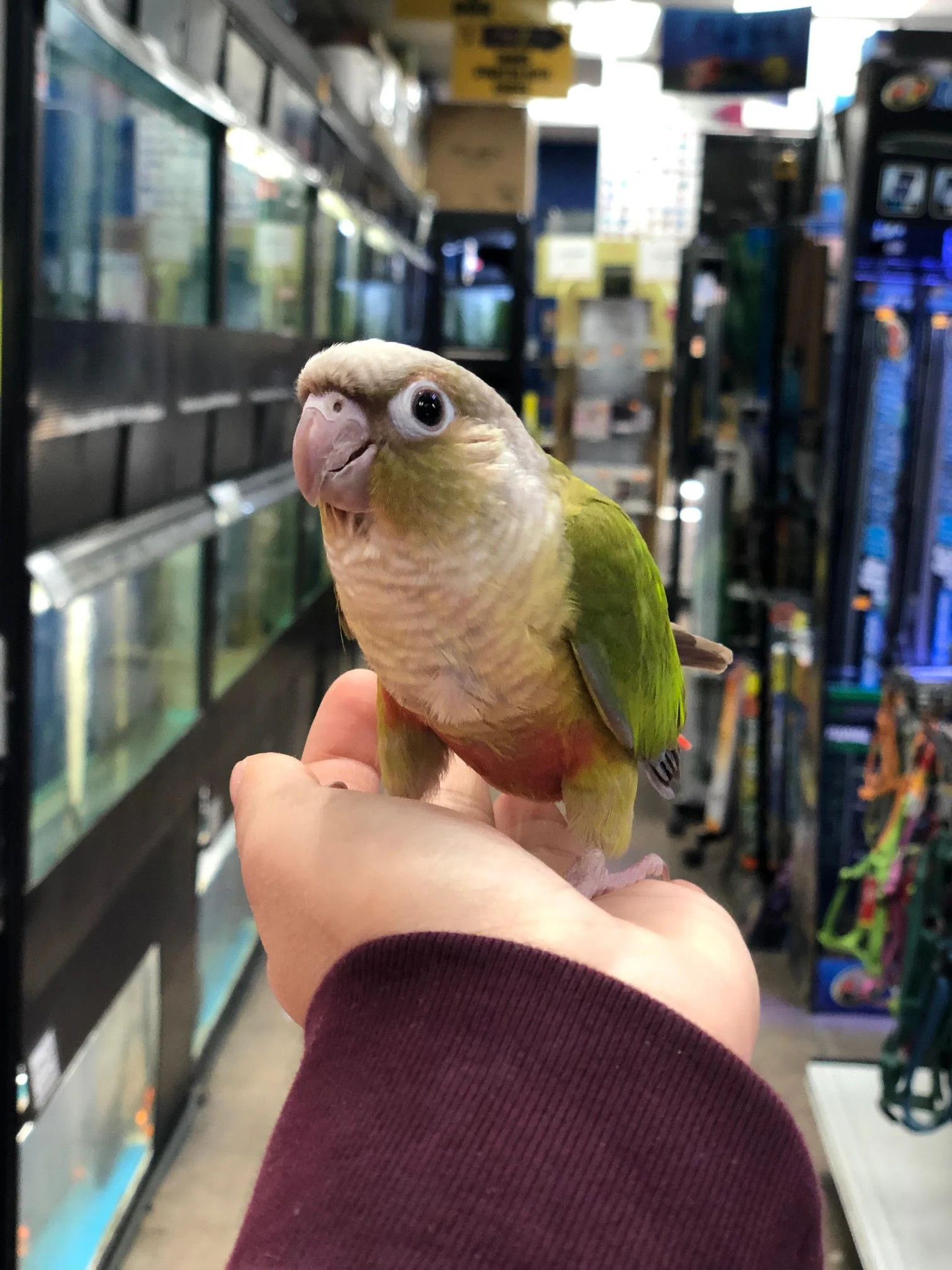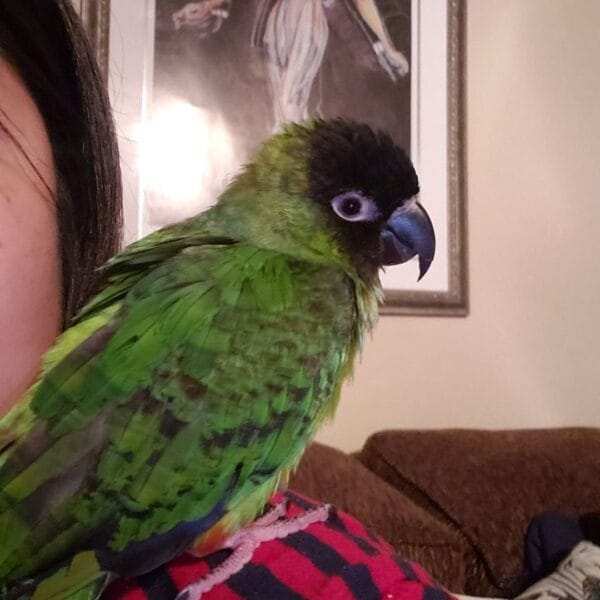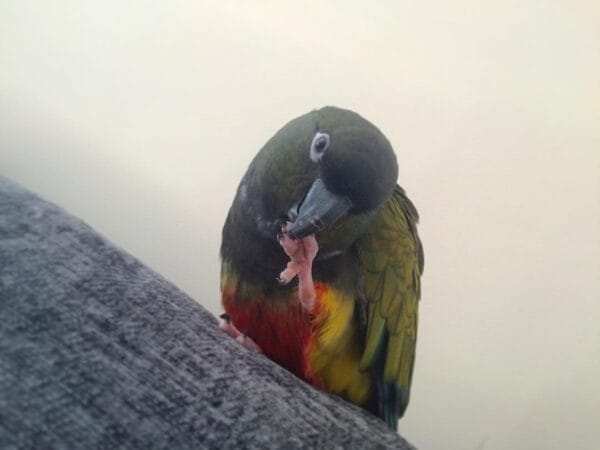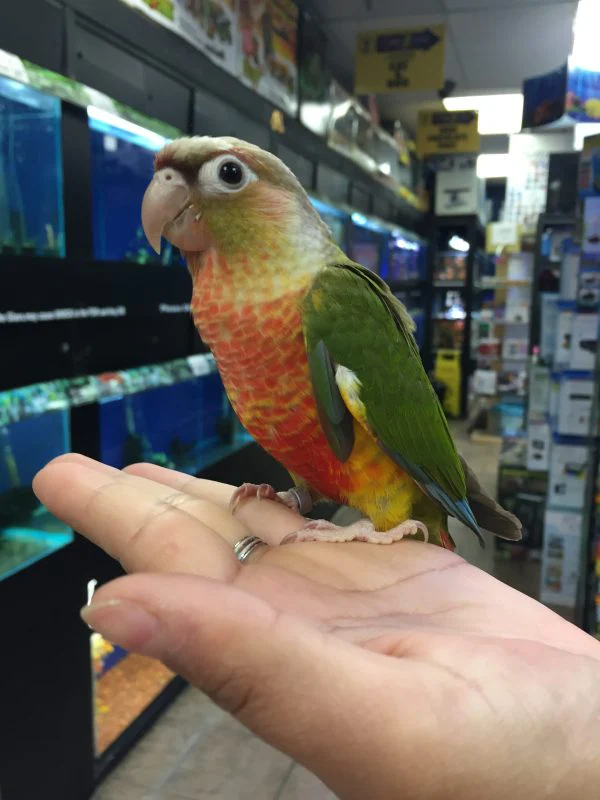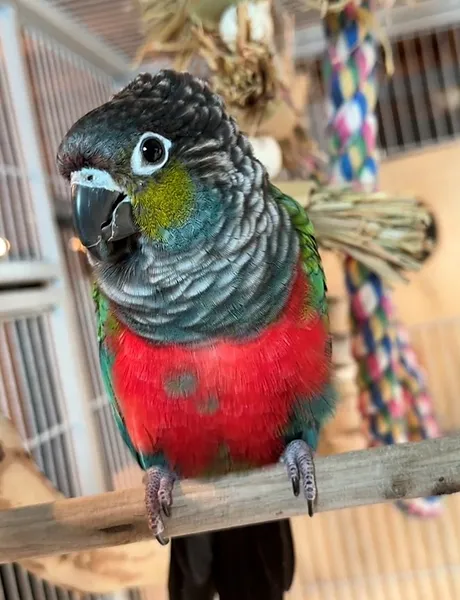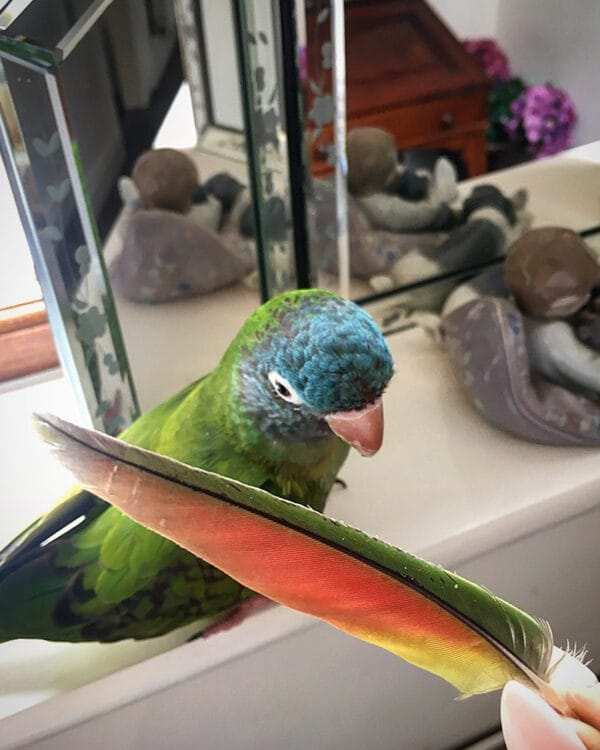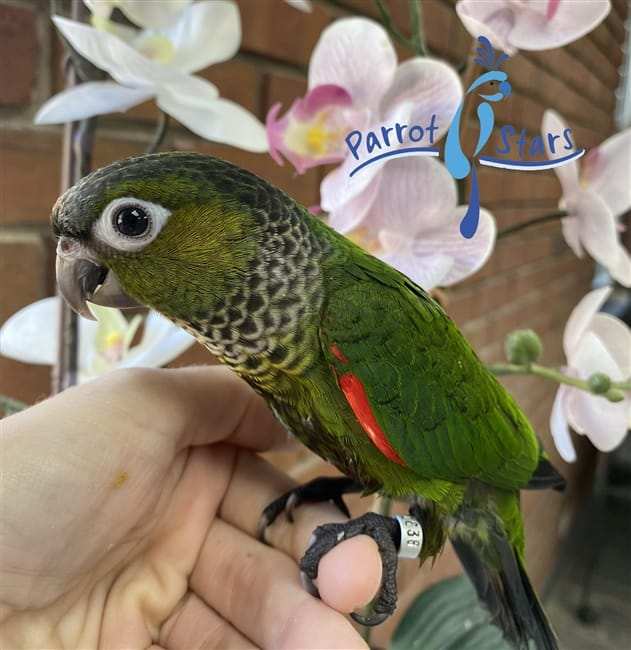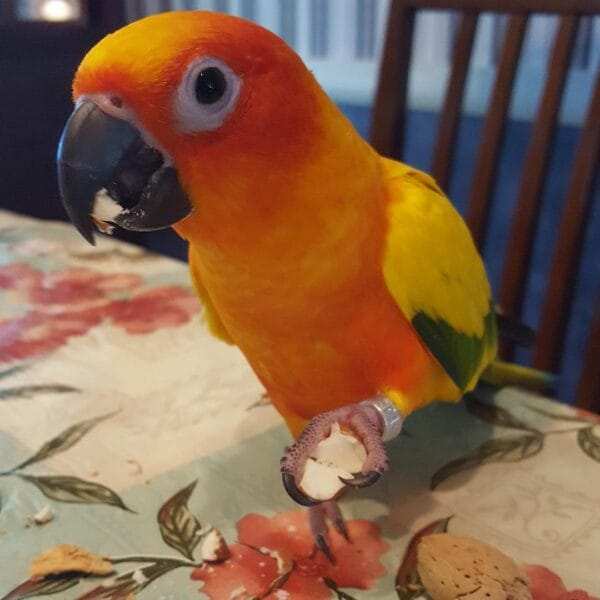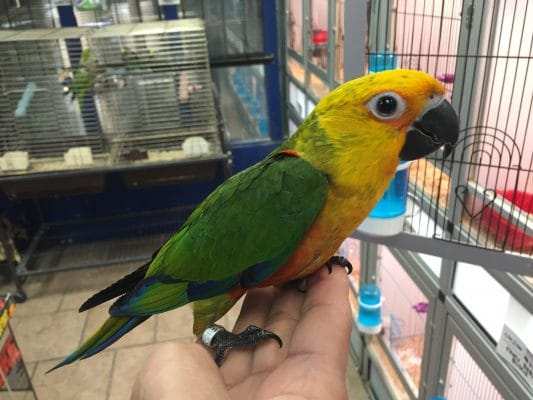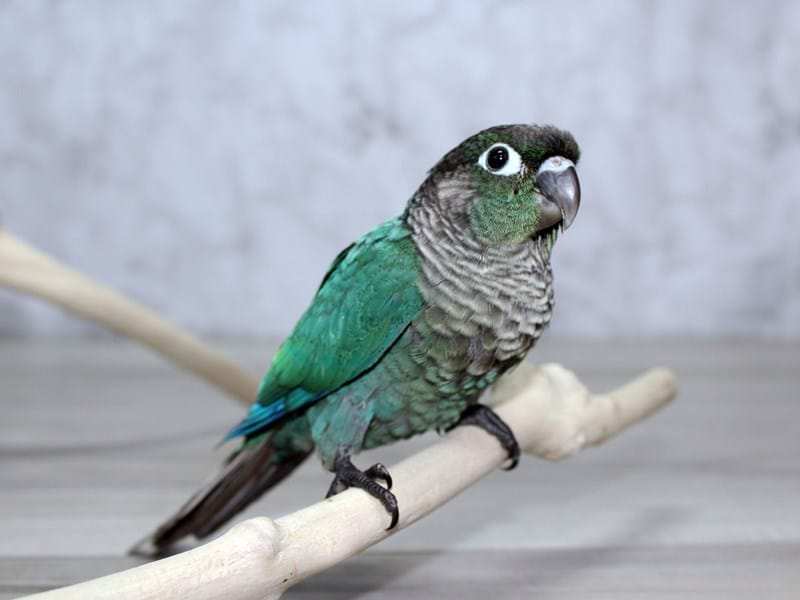Types Of Conures
Are you looking for your perfect feathered companion? Our different types of conures birds are the ideal pet bird, with a vibrant personalities that will keep you entertained. Not only do they make great pets, but their beautiful plumage and captivating calls will brighten up any home. Conure parrots come in wide different varieties; each species of this beloved family of birds is unique in its own way. From the playful Green Cheeked Conure to the larger Sun Conure, there’s sure to be a type of Conure that fits perfectly into your lifestyle. We’ll take an in-depth look at all the different kinds of conures so that you can find the right match for your needs.
If you want a pet bird who won’t just sit on its perch, then look no further than the friendly types of conures! With proper care and attention, these birds can quickly become part of the family — not just because they’re adorable but also because they offer companionship unlike anything else. Get ready to learn all about how to properly care for and interact with your new feathered friend!
Different Types of Conures Parrot
Are you looking for a feathered friend to brighten up your life? Consider getting a conure parrot! These colourful, playful birds come in wide types of conures and can make delightful companions. Let’s check a look at the different types of conures available so you can find the perfect bird for you.
Types of Conures Parrot and Their Characteristics
- Sun Conures: Known for their stunning orange heads and yellow-green bodies, sun conures are highly intelligent birds that are full of personality. They are social birds that love to play and interact with their owners.
- Green-Cheeked Conures: As one of the smaller varieties of conure parrots, green-cheeked conures are highly social and affectionate towards their owners. They have a playful and curious nature and are known for their silly antics.
- Jenday Conures: Jenday conures are one of the loudest varieties of conure parrots. They have bold and outgoing personalities and love to chat away all day long. They have a striking appearance with their bright orange and yellow feathers.
- Blue-crowned Conures: These conures have a blue crown, as their name suggests, and are known for their playful and affectionate personalities. They are highly intelligent and have the ability to learn words and phrases.
- Nanday Conures: Nanday conures are known for their expressive eyes and playful nature. Because of their high level of intelligence, they require a great deal of mental stimulation in order to remain happy and healthy.
No matter which types of Conures you choose, proper care is essential for them to thrive in captivity. Be sure to provide plenty of fresh food and water daily, along with toys or branches to climb on or chew. Additionally, it’s important to give them lots of attention – talk to them often, spend time playing together each day, and use positive reinforcement training techniques like clicker training if possible. With just a little effort on your part, your new feathery companion will be happy and content in no time!
Conure For Sale
Salma – Nanday Conure
Mason – Patagonian Conure
Logan – Golden Conure
Green-Cheeked Conure – Pineapple – Handfed
Single Factor Violet Conure
Coby – Crimson Bellied Conure
Coco – Blue Crown Conure
Black capped conure
Hand Fed Moon cheek conure for sale
Liam – Jenday Conure
Pineapple Conure (Pineapple Turquoise Blue)
Lin – Red factor Sun Conures
Green-Cheeked Conure – Cinnamon – Handfed
Turquoise Green Cheek Conure
Yellow Sided Violet Conure
Yellow Sided Green Cheek Conure Parrot
Sophia – Green Cheek Conure
1. Half-Moon Conure
In contrast to other types of Conures species, they are not known to be chatters yet still vocal. Half-moon conures are highly-spirited, spontaneous and love pleasing their owner. Moreover, they are more spirited and enjoy climbing; when they are excited to see you, their heads bob and dilate their eyes, showing off for you.

2. Mitred Conure
This green and red color mitred bird has a talent to become a chit-chatter, especially when trained well. They are very curious and eager to explore what’s around them but be careful because when their attention is denied, they are prone to nipping things and screaming. Not great for starters, but with consistent training and interaction, they can be manageable and fun. Also, they are very playful, and intelligent and perform tricks.

3. Green-Cheeked Conure
Mostly, Green-Cheeked conures are not talkers, but they are full of enthusiasm. Just be keen enough since these conures are naughty and full of antics. Green cheeks are suitable for children since the bird’s size fits well with little hands but never let them be handled alone since they might bite any time if not handled well.

4. Sun Conure
Eye-catching, colorful, and friendly, these conures have long been sought-after as a companion bird but be prepared since this is one of the loudest medium-sized parrots. Regardless, if you’re persistent and dedicated to training them and daily interactions, they can be well-behaved.
Having a Sun Conure can be an excellent safeguard for your home since they are capable of releasing a deafening scream when someone is at your doorstep.

5. Jenday Conure
Jenday conures are enjoyable, highly friendly, and easy to train. However, they are persistently noisy and disturb those who are sensitive with noise. Despite that, Jenday loves to hang around with you all day, especially on your shoulder.

6. White-Eyed Conure
If you’re into conures that love to talk, this White-Eyed conure is perfect for you with consistent training and keeping an eye on them. Be mindful that these species need a lot of attention, at least 3-4 hours of interaction, since they quickly get bored and stressed like plucking feathers. When properly handled, these conures are tenderhearted and charming.

7. Queen of Bavaria Conure
The Queen of Bavaria, also called the Golden Conure, is one of the distinctive endangered types of conures species and high-priced conures. You can quickly notice this bird because it is coated in vibrant golden feathers from its crown down to its claw.
Like any other birds, they are warmhearted, really lively and love to chew specifically on woods. Try providing them with some wooden toys to keep them busy. It is recommended to make time for them since they are very active and with high energy.

Behaviour Of Types of Conures (Parrots)
Conures, or parrots, are popular birds due to their vibrant personalities and inquisitive natures. When it comes to behaviour, conures have their own unique ways of expressing themselves. Let’s examine some of these wonderful animals’ most typical habits and see what we uncover.
First off, conures love to play! They can get quite mischievous when they’re bored – so make sure you give your feathered friend plenty of toys to explore. In order to keep oneself entertained, they can do any of the following:
1) Climbing branches and ladders
2) Exploring tunnels
3) Chewing on different objects (like paper or cardboard).
These activities not only help pass the time but also provide mental stimulation for your pet bird – something they need in order to stay healthy and happy.
It’s important to remember that conures communicate through vocalizations too! Whether it be chirping, whistling, or squawking – they express themselves by making noise. This way of communication isn’t always pleasant, however; if you hear loud screeching coming from your home, then chances are your bird needs more attention or has become agitated about something. It’s best to address any behavioural issues as soon as possible so that things don’t escalate further.
With proper care and training, keeping a conure can be an incredibly rewarding experience. They may take some getting used to because of their unique temperament, but once you understand them better, you’ll find yourself falling in love with these little social birds all over again!
The Size Of A Conure Parrot
When you think of parrots, many people imagine small birds with feathers in vibrant colours. But did you know that some types of parrots can be quite large? Conure parrots are medium-sized parrots that offer size and personality to avian families! These beautiful birds come in six different species – from sun conures to Mondays – each one boasting its own unique coloration and characteristics. It’s also important to note that these birds vary in size depending on which type you get. Generally speaking, most conures are about 10 inches long or longer and weigh between 3-4 ounces when fully grown.
With proper care, your Conure will provide hours of entertainment and companionship. They tend to be very social creatures who enjoy playing around and interacting with humans as well as other animals. Plus, because they’re quite hardy compared to smaller breeds, they make great pets, even if it’s your first time owning a bird. So why not consider adding an adorable conure parrot into your life today?

How Many Types of Conures And Colors Do Conure Parrots Have?
It’s no secret that conure parrots are known for their gorgeous colours and vibrant personalities. But how many different shades do they come in? It turns out the answer is quite a lot!
Conure parrots can be found in almost every colour imaginable – from electric blues to deep greens, with splashes of reds and yellows as well. Not only can they have multiple colours on each feather but also within one single feather, allowing them to create stunningly intricate patterns that often vary across individual birds. Plus, since most types of conures moult annually or bi-annually, you may even get to witness your bird change colours throughout its life!
And if all these beautiful hues weren’t enough already, some species also feature unique markings like stripes and spots around their eyes or down their backs. So whatever type of Conure you decide to bring home, know that it’ll always keep you entertained with its eye-catching array of colours and fascinating patterns.
The Colorful World of Conure Parrots: Patterns and Variations
- Blue: From light sky blue to deep navy, blue conure parrots are a popular and striking choice. They often have subtle green or gray accents in their feathers.
- Green: Green conure parrots come in a range of shades, from bright lime green to dark emeralds. Some species even have yellow or blue markings on their wings and tail feathers.
- Red: Red conure parrots are often a vibrant shade of scarlet, with bright yellow or orange accents on their wings and tail feathers.
- Yellow: Yellow conure parrots are often a soft, pastel shade with highlights of green or orange. Some species have bright yellow markings around their eyes or on their tails.
- Multi-coloured: Many conure parrots have a range of colours on their feathers, with intricate patterns and variations. Some even have spots or stripes around their eyes or down their backs.
Conure parrots are known for their stunning array of colours and patterns, and each individual bird is unique in its appearance. With so many colours and variations to choose from, you’re sure to find a conure parrot that catches your eye and steals your heart. And as your bird moults and grows, you may even get to witness its colours change and evolve over time, making for a truly fascinating and beautiful companion.
Are Conures High Maintenance?
Are conures high maintenance? The common question among prospective parrot owners; is the answer to this can depend on a few factors. From their diet and housing needs to their personality traits and behaviours, let’s take a deeper look into what makes these birds so special—and potentially challenging to care for.
First of all, it’s important to note that each type of Conure has its own unique characteristics and tendencies. For example, some may be more inquisitive or playful than others, while some may exhibit bolder personalities. Additionally:
- They require plenty of attention from humans – usually an hour or two per day – as well as mental stimulation through activities such as climbing, playing with toys and exploring different parts of their cage.
- Their diets should include fresh fruits and vegetables in addition to pellets, nuts and other nutritious treats like millet sprigs.
- Regular vet visits are also necessary in order to ensure they stay healthy and free from disease or injury.
In short, yes – Conures can be considered higher maintenance compared to most companion animals due to their specific dietary and socialization needs. Yet, with proper care, they become wonderful companions who bond with their human caretakers! With patience, devotion, and knowledge of their behaviour patterns, they’re rewarding pets that provide delight to your life every day.

What Is The Going Rate For A Conure Parrot?
When it comes to getting a conure parrot, one of the most important questions you’ll have is, “What’s the going rate?”. After all, these birds can be quite an investment. But don’t worry – we’ve got you covered! Everything you should know about purchasing a conure parrot and its price is as follows:
- Look for reputable breeders who specialize in conures.
- Consider factors such as age, coloration, and health when deciding on your bird.
- Research prices across different sources so that you get the best deal possible.
As with any purchase, price plays an important role when it comes to finding a types of Conures that fits your needs and budget. To help make sure you find a good deal, take some time to research reputable breeders who specialize in conures and compare prices from multiple sources before making your decision. Additionally, consider other factors such as age, coloration, and overall health of the bird – after all, money isn’t everything!
Making sure you find the right fit for both your lifestyle and wallet is key when shopping around for a pet bird like a conure parrot. With proper care and attention, they can be lifelong companions full of personality who will love their humans unconditionally – now that’s priceless! So whether you’re ready to commit or just doing some initial research into owning one of these wonderful creatures, it never hurts to do your homework first!
The cost of a Conure Parrot can vary depending on the type of Conure and the breeder or pet store you purchase it from. In Canada, the price range for a Conure Parrot is typically between $300 and $800 CAD. However, the price can be as low as $135 for a Sun Conure, depending on the breeder. Some Conure Parrots, such as the Golden Capped Conure, may be priced at $850 or even higher.
What Is The Average Lifespan Of Types of Conures Parrot?
So you’ve decided to get a conure parrot but have questions about their lifespan? You’re in luck! Conures are known for being active and playful birds with long lifespans. Let’s take a closer look at the average life expectancy of these amazing creatures. The average lifespan of a conure can range anywhere from 15-30 years, depending on how well they’re cared for. With proper nutrition and environment, it is not unheard of for some species to live up to 50 years or more! This means that if taken care of properly, your feathered friend could be around for quite a while. Providing you with lots of love and companionship for many years to come.
Conures require a lot of attention. So make sure you have plenty of time available in order to give them the best possible quality of life. By taking good care of them now. You’ll ensure they can enjoy a longer life span filled with joy and laughter. Plus, as an added bonus, having such a devoted companion will bring even more happiness into your own life too! It’s true that owning any pet comes with its own set of responsibilities. Yet investing in the health and well-being of your Conure is well worth it. When considering all the unconditional love they offer. So go ahead and show them some extra TLC – your feathered pal deserves nothing less than the very best!
How To Determine Which Gender Of Conure Parrot You Have?
Deciding the gender of your conure parrot is an important part of understanding how to care for them properly. But it can be a challenging task, especially if you don’t know what signs to look out for! First off, some species are easier than others when it comes to determining genders. For example, sun conures and Nanday conures have distinct differences in colour between males and females. So simply looking at their feathers will give you a good indication. On the other hand, many species do not show as clear visual cues, so more advanced methods must be used.
One thing that remains consistent with all types of conures is behaviour. Although subtle differences exist between male and female birds (such as vocalizations or mating behaviours). These clues are not always evident if the bird has been raised alone since birth or adopted from a shelter. In this case, DNA testing —requires only a small sample of feathers or blood. Is often recommended by avian experts since it provides reliable results without having any impact on your pet’s health.
Is It Possible For A Conure Parrot To Talk?
When considering a Conure parrot as a pet, it’s natural to wonder if they can talk. The answer is yes! With the right environment and training from their owners, Conures are capable of learning some words or phrases – something that any bird enthusiast would find both delightful and rewarding. In order for your feathered friend to learn how to speak, you’ll need to provide plenty of vocal interaction with them on a daily basis. This could include simple phrases such as “good morning” or “hello.” It may take time before your Conure picks up these words, but patience will pay off in the end when you hear your Conure mimic what you’ve been saying all along.

There are also many different types of toys available specifically designed to help encourage verbal communication between your Conure. Toys like those that make sounds when touched or shaken can be especially helpful while teaching your bird new words. TIP: Make sure to give yourself enough time each day dedicated solely to talking with your Conure in order for them to pick up more complex language skills over time. Positive reinforcement should always be used when interacting with them so as not to discourage their progress!
Conures Love To Create Sounds
Conures are known for their singing and talking capabilities, but did you know they also love to create sounds? These birds have a beautiful repertoire of chirps, whistles, and calls that will delight any bird-lover. Not only can conures make music with their own vocalizations, but they can also learn human words too!
Their intelligence allows them the ability to mimic speech. However, it takes patience and consistency on your part if you want them to talk regularly. You’ll need to give lots of encouragement when these birds produce new sounds or attempt to repeat something back. This is one way for your conure parrot to enjoy freedom – by expressing themselves through language.
It’s important that you provide plenty of opportunities for your feathered friend to practice speaking. As well as listen carefully in order for them to get better at making verbal communication. With enough dedication from both sides. Not only will you form an even stronger bond with each other. But you’ll be able to understand more about what your Conure has been trying to say all along!
A Conure Parrot’s Dietary Needs
A conure parrot’s dietary needs are essential for its overall health and well-being. It’s important to understand what these birds need in order to ensure they stay healthy, vibrant, and happy. Here’s a closer look at the diet of a conure:
- Pellets – A main component of any bird’s diet should be formulated pellets. These provide essential vitamins, minerals, proteins, and other nutrients that can’t necessarily be found naturally in food sources or through supplements.
- Vegetables – Fresh vegetables like carrots, broccoli, spinach, kale and bell peppers make great snacks for conures. They offer natural vitamins and minerals as well as some protein content too.
- Fruits & Berries – Conures love sweet fruits like apples and bananas but also enjoy various types of berries as well. Some favourites include blueberries, strawberries, raspberries and blackberries!
- Nuts & Seeds – While nuts are loaded with fat (which is good!), you want to make sure not to give your pet too much of them on a daily basis. Offer small amounts such as peanuts or almonds once in a while for an occasional treat!
It’s important to remember that each species of Conure has its own specific nutritional requirements. So it’s best to consult with a veterinarian before deciding on any particular type of diet for one particular bird. Additionally, don’t forget about providing fresh water every day. Clean drinking water is critical for keeping your feathered friend feeling his or her best! All in all, by familiarizing yourself with the special dietary requirements of your conure parrot and following up with regular vet visits. You’ll have a happy companion who will bring joy into your life for years to come! You can check some common nutritional issues in pet birds for additional information.
What Kind And Size Of Cage Is Appropriate For A Conure Parrot?
When it comes to keeping a conure parrot, the cage is just as important as diet and care. So, what kind and size of the cage should you choose? The ideal size for a conure’s cage depends on its breed – larger species need more space. Generally speaking, though, your bird will feel most at home in a large enough enclosure that it can move around freely while standing up straight with its wings outstretched. The bar spacing also needs to be suitable for the type of Conure: usually 1/2″ – 5/8″.
It’s essential to make sure your pet has plenty of stimulation in their environment, too; perches, swings, ladders and toys are all great additions which encourage natural behaviours like climbing and playing. And don’t forget about safety features such as locks or latches if needed! Remember: A happy conure means an enriched life both for them and you! So when thinking about how best to provide for your feathered friend. Keep in mind the type of Conure you have and create an appropriate habitat with lots of enrichment activities so that they can thrive. You’ll soon see why these colourful characters are such beloved pets!
Common Health Problems Of Conure Parrot
Though they may seem like small, fragile creatures, conure parrots are actually quite hard animals. Unfortunately, this doesn’t mean that they’re immune to health issues. In fact, it’s important to be aware of common health problems associated with these birds in order to keep them happy and healthy. First off, respiratory infections are sadly all too common among conures. Just as is true for many other types of pet birds. This can often occur when their living environment is not properly kept clean or if temperatures get too cold. Signs of infection include sneezing and mucus around the nostrils or eyes. Regular vet visits and proper hygiene habits should help keep your bird safe from this kind of problem.
In addition to respiratory illnesses, another big concern for conure owners is feather plucking disorder (FPD). FPD occurs when a bird begins plucking its own feathers due to stress or boredom. Something which can quickly lead to an unhealthy physical state if left untreated. To avoid such a situation, provide plenty of enrichment activities and toys in your parrot’s cage so that it will stay both physically and mentally stimulated throughout the day! No matter how much care you give your feathered friend on a daily basis. There’s always the possibility that it could develop one of these conditions – but fortunately. Both can usually be managed successfully with veterinary assistance. Therefore, regular checkups by an avian veterinarian are essential for protecting the well-being of your beloved companion parrot!



